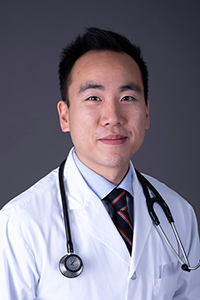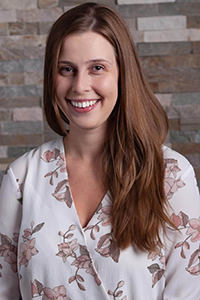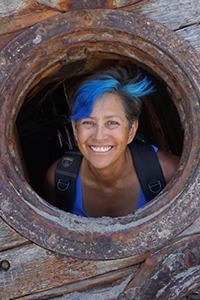Letter to Yourself – Terms & Conditions
- The letter remains your property; UBC will not open the letter and takes no responsibility for the contents of the letter
- The letter will be given to you in person or mailed to your last known address when you leave the program
- You can request to receive the letter earlier if you wish
- In the event that you die or become incapacitated, the letter will be stored for 3 years and will be available upon request to the legal personal representative or, if there is no such person, to your closest relative
- UBC will exercise reasonable security measures over the letter and will use reasonable efforts to ensure the letter is returned to you at the appropriate time, but UBC will not be liable for any damages resulting from the loss or misdirection of the letter
Dr. Dan Le, MHA’09, MD’13

After many years of living, studying, and working in Prince George, including developing the Northern Cancer Control Strategy, Dr. Dan Le, MHA’09, MD’13 is currently a medical oncologist based in Surrey, B.C.
What is your current role?
Medical Oncologist, BC Cancer – Surrey
Managing Director, BC Cancer Medical and Dental Staff Association
Clinical Assistant Professor, University of British Columbia
What drew you to the Northern Medical Program (NMP)?
Prior to medical school, I had grown up in small towns and had lived in Prince George for several years. I started my career working for Northern Health in Prince George, and was part of the team that developed the BC Cancer – Centre for the North and the Northern Cancer Control Strategy. I was fortunate early on in my career to have had several mentors in northern B.C. (Dr. Ronald Chapman, Dr. Winston Bishop, Dr. David Snadden, to name a few) who inspired me to pursue a career in medicine. When it came time to apply for medical school, my choice to begin my medical journey in northern B.C. was natural.
Tell us about your favourite memory about studying in the NMP.
Problem-based learning at the NMP every Monday, Wednesday, and Friday at 8 am. We would make a habit of bringing in a variety of snacks and baked goods to keep us energized through the morning. We also had local problem-based learning tutors that would keep us engaged and would ensure a northern B.C. context would be integrated into whatever we were learning at the time.
What is your biggest takeaway from the NMP?
The Northern Medical Program provided an unparalleled opportunity for me to experience, and develop an understanding of, practicing medicine within northern, rural, and remote communities. The program excels at integrated learning, and enables one to learn from the full spectrum of healthcare professionals in northern B.C. including physicians, nurses, pharmacists, and allied health. I developed an appreciation for the importance of team-based and patient-centred care early on during my time at the NMP, and this has translated into my current practice as a medical oncologist.
Do you have any advice for students in the NMP?
Keep an open mind and try to immerse yourself in as many clinical opportunities across northern B.C. as you can. As you progress through your medical training, recognize that it is not just important to figure out what area of medicine you wish to practice in (primary care vs. specialty medicine), but also what types of communities you enjoy working in, whether you prefer an office-based practice versus a hospital-based practice, and whether you wish to have a more academic/research or community-based lens to your practice. All of these factors will help guide your decisions and set you up for a fulfilling career in medicine.
Who is the most influential person of your life so far?
Dr. Winston Bishop, who is now a retired medical oncologist in northern B.C., was a very important influence for me prior to, and during, medical school. I met Dr. Bishop in 2007 when I first moved to Prince George and at that time, he had already been practicing in northern B.C. for 20 years as the first and only medical oncologist. He inspired me with the way he eloquently communicated with patients, families, and other healthcare professionals. I was impressed by his tremendous dedication to the community, and his exceptional clinical skills. My experience getting to know Dr. Bishop significantly influenced my choice to specialize in medical oncology.
How has the COVID-19 pandemic affected you?
The COVID-19 pandemic has made it challenging to continue to offer cancer treatment in a way that maintains social distancing and minimizes potential COVID transmission amongst cancer patients who are often immunosuppressed. We have adapted by implementing strong infection control practices and being innovative in the way we use virtual care.
What do you consider your greatest achievement or what are you most proud of?
Being part of the initial team at Northern Health and BC Cancer that developed the BC Cancer -Centre for the North and the Northern Cancer Control Strategy before I started medical school. Then returning after my oncology training to work at the BC Cancer – Centre for the North as a medical oncologist prior to starting my current role at BC Cancer – Surrey. I came full circle!
Name one thing on your bucket list.
My wife and I are avid rock climbers, but we have not yet explored the rock climbing that northern B.C. has to offer. It is on our bucket list!
View more profiles of NMP alumni:
Dr. Dayle Ostapiuk, MD’18

Having grown up in Prince George, Dr. Dayle Ostapiuk, MD’18 was drawn to the Northern Medical Program instantly. After graduation, she now remains in Prince George, working as a third year psychiatry resident.
What is your current role?
I work as a UBC psychiatry resident in my third year at the Prince George site.
What drew you to the Northern Medical Program (NMP)?
I grew up in the Prince George region and I have always felt that there is a wonderful sense of community. I wanted to study and return as a doctor to work here so NMP was an easy first choice.
Tell us about your favourite memory about studying in the NMP.
My favourite memory of NMP is of third year in its entirety. There is something poignant about that year as it encompasses some of the greatest growth and struggles as we find our feet as professionals and also bond as colleagues.
What is your biggest takeaway from the NMP?
I am going to risk sounding cliché. The biggest takeaway for me was that we don’t know what is possible until we ask and the NMP program provides that perspective, both with asking what is possible from an education standpoint and encouraging us to be curious about ourselves and of our patients. I think there is so much potential in a question.
Do you have any advice for students in the NMP?
Yes, I think I have something to offer. Students have all competed in one way or another for acceptance into this program; I’ve found that this acceptance process frames an environment of high personal and professional standards while laying a foundation for a collegial bond through shared experience. My suggestion for NMP students is to trust that you belong in the program, to enjoy yourselves more, and to build relationships with classmates earlier.
Who is the most influential person of your life so far?
First of all, that’s a difficult question because context always matters. I actually can’t share that story because it belongs to a patient and is confidential. However, I can share that person changed my perspective on many topics and the memory fills my compassion cup when I’m particularly tired.
How has the COVID-19 pandemic affected you?
COVID-19 has offered unwanted discomfort both personally and professionally as so many people have struggled during this time. However, it has also offered some beautiful gifts that I don’t think I would have encountered in our previous routine. I have had time to reflect and explore personal and academic topics in both the physical socially distanced space COVID-19 created as well as the time now available due to lack of social events. I have been appreciative of this time.
What do you consider your greatest achievement or what are you most proud of?
My greatest personal achievement has been scuba diving.
Name one thing on your bucket list.
I want to go skydiving.
View more profiles of NMP alumni:
Dr. Lorraine MacDonald, MD’09
 Through her medical training in northern B.C. and learning about the disparities in the provision of medical services, Dr. Lorraine MacDonald, MD’09 was inspired to practice as a family physician in rural and First Nations communities on Manitoulin Island in Ontario.
Through her medical training in northern B.C. and learning about the disparities in the provision of medical services, Dr. Lorraine MacDonald, MD’09 was inspired to practice as a family physician in rural and First Nations communities on Manitoulin Island in Ontario.
What is your current role?
I am a locum physician providing primary care services to First Nations communities on the Manitoulin Island.
What drew you to the Northern Medical Program (NMP)?
I was very interested in the smaller class size and the location of the program. I was also drawn by the reputation of UBC as an institution. I had worked with a number of MDs during my time as a medic and a PA who had graduated from UBC. Those particular physicians were incredible – smart, knowledgeable, and compassionate. They were personable and approachable, and demonstrated real concern and caring for their patients. I wanted to be that kind of doctor.
Tell us about your favourite memory about studying in the NMP.
There were so many moments over the course of those four years. I think the first day after the Christmas break when we all gathered in the atrium of the NMP site. We had already completed the first semester in Vancouver so we all knew each other, but now it was just us and it was like the “real” beginning of the Northern Medical Program Class of 2009. I also have many fond memories of group studying and studying with my study partner, Amy Johnson. We spent hours at my house in my dining room with a large white board going over the intricacies of the kidney. UGH!!
What is your biggest takeaway from the NMP?
My biggest takeaway was not specific to NMP, but perhaps it was revealed to me more than if I had gone to medical school in a more traditional institution (big city school). I really had no clue about medical care in Canada and specifically in rural areas until I went to Prince George and traveled around northern B.C. through out medical school. I was aware of the disparities in the provision of medical services to First Nations because that affected my family directly, but I learned a lot about other marginalized communities – the poor, folks with mental illnesses, the homeless to name a few. What I realized is that the majority of Canadians were not in need of my services; it was the minority of Canadians who needed my services the most and so I have chosen to practice in rural areas and on First Nations territories.
Do you have any advice for students in the NMP?
I hope that all graduates from the NMP remember to give back by making sure they in some way provide services to rural, remote and/or First Nations communities. Even if you become a specialist with a very specific focus, find a way to provide your clinical services to these communities – do monthly clinics, make yourself accessible to rural doctors via e-consult services. If you are considering being a family physician, please consider practicing in under serviced areas. Yes it can be scary in a small community, but I guarantee you people will come and help without question and you will learn so much and gain such confidence you will wonder why you were so scared that first shift.
Who is the most influential person of your life so far?
That is easy – my mother, Shirley Elizabeth MacDonald nee Dominic. A survivor of the residential school system, she was a strong, dynamic, quiet person who always told me that the way forward for our communities was through education. Unfortunately, she passed away before I even considered applying to medical school. Now I am a practicing physician and I am serving the communities of the Manitoulin Island where she was born and raised before she was taken away. I am very proud of her, she endured a lot and as I walk this land I feel very connected to her.
How has the COVID-19 pandemic affected you?
I do locums for an organization on the Manitoulin Island in Ontario called Noojmowin Teg which provides medical coverage (NPs, RPNs and MDs) to the various First Nations communities on the island. With the outbreak of the pandemic. I have returned to the island to provide virtual and in person primary care. So far we have not had any positive cases in any of our First Nations communities here on the island. My day to day practice of medicine has certainly changed in ways that really are quite astounding, but aren’t we lucky that we have relatively wide spread access to technology.
On a personal note, I have a dear friend who’s whole family has been engulfed by the pandemic. Three out of her five immediate family members experienced mild symptoms and tested positive while her mother has been severely affected. She was intubated for close to two months and after three months of hospitalization she has recovered enough to return home. The family was only able to visit her twice in person, all other contact was via FaceTime or Zoom. It was excruciating to see this family as they huddled around their computers in their separate homes to see their mom in the ICU. Their emotional suffering has reminded me that my responsibility as a physician is not confined to the physical health of the patient but must include their spiritual and social well-being and extend to their circle of family and friends.
What do you consider your greatest achievement or what are you most proud of?
Becoming a physician, still blows my mind.
Name one thing on your bucket list.
Prior to COVID-19, I alternated locums with travel both domestic and international. Most of bucket list would consist of going places I have not gone yet. I would really like to take a year, maybe two, and just travel around the world – start heading West and just keep going until I ended up back where I started. Not sure how likely that will be. In the meantime, I really hope I can get my puppy to come when I call her – it’s a good thing she is a cutie.